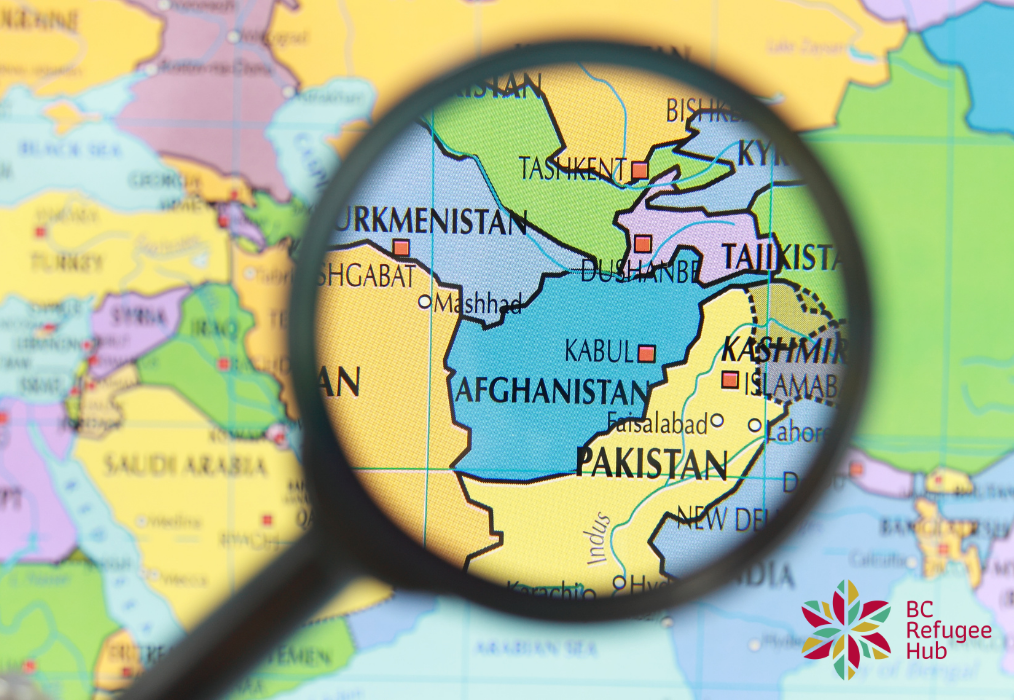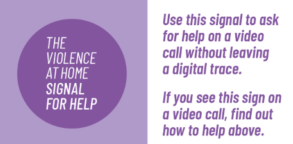This online toolkit curated by the BC Refugee Hub includes a short guide to mental health, mental illness, trauma, and resources available to those working with refugees and refugee claimants, along with services and supports available for refugees and refugee claimants.
Key Definitions:
What is mental health?
Mental health is the state of your psychological and emotional well-being. It is a necessary resource for living a healthy life and a main factor in overall health.
Good mental health allows one to feel, think, and act in ways that help you enjoy life and cope with its challenges. The signs and/or symptoms include but not limited to.
- Feeling in control of your life and personal decisions
- Being able to cope with life’s challenges and stresses
- Functioning well mentally, such as being able to focus while at work
- Feeling physically healthy and getting enough sleep
- Feeling a sense of belonging in your community such as a school, church, neighborhood etc.
It is important to note that it does not mean the same thing as mental illness however, poor mental health can lead to mental and physical illness. The signs of poor mental health include but not limited to.
- Feeling sad, down, or low mood
- Excessive fears or worries, or extreme feelings of guilt
- Finding it difficult to control your emotions
Mental illness
Mental illness is the reduced ability for a person to function effectively over a prolonged period because of.
- significant levels of distress
- changes in thinking, mood, or behaviour
- feelings of isolation, loneliness, and sadness
- the feeling of being disconnected from people and activities
Trauma
Trauma is both the experience of, and a response to, an overwhelmingly negative event or series of events, such as interpersonal violence, personal loss, war, or natural disaster. In the context of violence, trauma can be acute (resulting from a single event) or complex (resulting from repeated experiences of interpersonal and/or systemic violence).
According to research carried out by The University of British Columbia, University of Northern British Columbia and Western University, Trauma can also result from what doesn’t happen, for example when systems fail to recognize and respond to people’s violence experiences. More on this can be found here.
Mental Health and Post-Traumatic Stress Disorders (PTSD) Prevalence Among Refugees
Globally:
According to the World Health Organization (WHO):
- Among people who have experienced war or other conflict in the previous 10 years, one in 11 (9%) will have a moderate or severe mental disorder.
- One person in five (22%) living in an area affected by conflict is estimated to have depression, anxiety, post-traumatic stress disorder (PSTD), bipolar disorder, or schizophrenia.
According to the UNHCR, around 15%-20% of displaced people experience mental health problems, and most of them on the mild part of the spectrum.
About one out of three asylum seekers and refugees experience high rates of depression, anxiety, and post-traumatic stress disorders (PSTD).
Prevalence estimates of mental health disorders vary widely from 20% to 80% with the breakdown as 4% to 40% for anxiety, 5% to 44% for depression, and, 9% to 36% in PSTD. You can read more on the factsheet published by the American Psychiatric Association here.
In Canada:
In a publication by the Canadian Collaboration for Immigrant and Refugee Health (CCIRH), the prevalence of PTSD among child refugees is approximately 11%. Prevalence estimates have ranged, however, from a low of 5% to a high of 89%. You can read more here.
A study of Canadians aged 45-85, in the International Journal of Social Psychiatry, found that 24% of refugees were in psychological distress compared to 13% of non-refugee immigrants and those born in Canada. Read more here.
15 to 18% of all refugees who come to Canada, or about 4,300 to 5,100 people per year, require a formal mental health clinical intervention to help them address trauma, according to research by ISS of B.C.
A study conducted by the ISS of BC on the wellbeing of Government Assisted Refugees (GARs) in 2016 revealed that 30% refugees reported low well-being and were “sad” or “depressed.”
Source:
- Public Health Agency of Canada. (n.d.). Trauma and violence-informed approaches to policy and practice – Canada.ca. Government of Canada – Public Health Agency of Canada. Retrieved July 27, 2021, from https://www.canada.ca/en/public-health/services/publications/health-risks-safety/trauma-violence-informed-approaches-policy-practice.html
- Tong, H., Lung, Y., Lin, S. L., Kobayashi, K. M., Davison, K. M., Agbeyaka, S., & Fuller-Thomson, E. (2020). Refugee status is associated with double the odds of psychological distress in mid-to-late life: Findings from the Canadian Longitudinal Study on Aging. International Journal of Social Psychiatry, 002076402097100. https://doi.org/10.1177/0020764020971003
Capacity Building Publications, Training and Resources for those Working with and Supporting Newcomer Refugees and Refugee Claimants
BC Refugee Hub
The BC Refugee Hub hosted a two-part webinar series designed to support organizations working with refugee claimants. The series delved into trauma-informed practices, focusing on cultural sensitivity and the emotional challenges faced by refugee claimants. This series was especially valuable for those seeking to build a deeper understanding of the mental health impacts on both clients and service providers.
View the session records for this series here.
VAST
Affiliation of Multicultural Societies and Service Agencies of BC (AMSSA)
AMSSA is a unique province-wide association that strengthens over 80 member agencies as well as hundreds of community stakeholder agencies who serve immigrants and newcomers, and build culturally inclusive communities, with the knowledge, resources and support they need to fulfill their mandates.
- The Other Side of Trauma: Supporting Newcomers through Healing and Resiliency Centered Engagement
This follow-up webinar addressed how we can further support our more vulnerable newcomers to Canada through learning with healing centered engagement. Watch the webinar via this website.
- Refugee Mental Health Front-line Workers Training
The training course identifies different refugee categories in Canada, stages of refuge and resettlement stress factors that contribute to mental health challenges for Refugees. It describes approaches and practical tools for assessing refugee trauma and addressing mental health needs. The course will help front-line workers recognize the signs and symptoms of vicarious trauma/burnout and best practices for self-care. Here is the website.
- Trauma Informed Practice: Supporting Clients Who Have Experienced Complex Trauma
This 2016 webinar explored the impact of trauma and identified how immigrant serving agencies can offer services in a trauma-informed manner, set policies, and encourage interactions with clients that facilitate healing and growth. You can watch the webinar here.
Centre for Addiction and Mental Health – Immigrant and Refugee Mental Health Project
The Immigrant and Refugee Mental Health Project was developed by the Centre for Addiction and Mental Health’s (CAMH) Health Equity Office, with funding from Immigration, Refugees and Citizenship (IRCC) and in collaboration with experts in the field. It is an evidence-based, capacity-building initiative, designed to enhance your knowledge and skills as a settlement, social or health service provider to appropriately respond to the unique mental health needs of immigrants and refugees, and to foster inter-sector and inter-professional collaboration. Building on the success of the award-winning Refugee Mental Health Project, this project provides five different avenues to enhance knowledge, develop skills, and build networks. These avenues include online courses, webinars, monthly e-newsletters, a community of practice, and this toolkit.
Learn more here>>
CMAS: The Resilience Guide – Program Strategies for Responding to Trauma in Refugee Children
Many of the things we already do in early childhood programs—like providing safe, predictable routines; helping children manage feelings and behaviours; and providing creative, sensory and physical activities—not only support healthy child development, but also strengthen the capacity for resilience and recovery in young children who have experienced trauma.
The Resilience Guide will help you and your team understand:
- the impact of the refugee experience at different ages,
- the developmental effects of trauma and resettlement,
- key strategies to strengthen families’ capacity for resilience, and
- practical tip sheets designed to easily print out and share with your team.
Available in English and French.
VAST – Landing and Settling: A Group Therapy Program for Refugees in British Columbia – Therapist Manual
This manual was produced by VAST, with funding from the Province of British Columbia under the Refugee Readiness Fund.
This manual is designed to provide mental health practitioners with a structured, yet flexible approach to early intervention with refugee populations who have recently arrived in British Columbia. The approach described within the therapist manual aims to assist refugees to cope with common stress reactions and to differentiate these from more serious mental health problems, as well as to support the personal resilience and problem-solving capacities needed to overcome the challenges of daily living that refugees commonly face. To view, click here.
VAST – Vulnerability Screening Tool
The Vulnerability Screening Tool has been developed by the Vancouver Association for Survivors
of Torture (“VAST”) for use by mental and primary health professionals, as well as settlement and social service providers, private sponsors, and other community members who are supporting refugees on arrival in British Columbia. This tool has been developed for the use of a broad spectrum of service providers throughout the province, who may or may not have experience working with refugees. This document is not a diagnostic tool, but rather a screening tool for vulnerability.
Refugees in the early stages of resettlement are vulnerable to mental health challenges as a result of past trauma, as well as to current stressors related to the settlement and adaptation process. This tool has been designed in three parts in order for service providers to consider a range of mental health, settlement, and resiliency factors. We strongly recommend that mental and primary health professionals and settlement and social service providers work in collaboration to ensure that settlement needs and material well-being are integrated with psychosocial support and medical treatment. To view, click here.
PIRS – Community Based Training for Working with Immigrants and Refugees – A Trauma-Informed Approach (Webinar and Guide)
This webinar addresses how we can further support our more vulnerable newcomers to Canada through learning with healing centered engagement. This learning event will explore how those with migration journey experiences can move beyond merely coping with trauma, and explore their own resiliency and positive transformative changes that can occur beyond trauma, allowing positive emotional growth and a greater sense of well-being.
View Webinar Here>>
View Guide Here>>
Infographic: Safe Spaces – Youth with Refugee Experience and Their Parents Harnessing Resilience
New infographic project on refugee youth and their parents’ participation in a resilience-building workshop.
Objective: This study aims to create a space of open discussions for Arabic-speaking refugee youth with experiences of trauma and their parents, in order to explore the tensions that may arise between youth and parents from social integration challenges and concepts and issues related to culture, inter-family communication, rights, and youth empowerment.
Justification: This study will work to develop coping skills (anger management, stress management, emotional expression, affect regulation) and life skills (negotiating, compromise, respecting different opinions, problem solving, and non-violent conflict resolution) in refugee youth and their parents so as to build resilience.
Practical goal: In addition to building resilience and coping and life skills in refugee youth and their parents, this study will contribute to the literature on refugee youth and their families’ experiences with social integration challenges, particularly how young people’s experiences of trauma affect social integration in the context of the family.
Primary audience: refugees, service providers, academics, educators, and policy makers
View the full project and info-graphic here>>
UBC Psychology and ISSofBC – Settlement-Integrated Refugee Mental Health
Resources and Supports for Refugees and Refugee Claimants
Vancouver Association for the Survivors of Torture (VAST)
VAST supports refugee mental health through counselling, documentation, education, and referrals.
Address: 2610 Victoria Drive, Vancouver, BC V5N 4L2, Canada
Contact: (778) 372-6593 Phone: 1 (604) 588-3071
MOSAIC Counselling – Newcomer Wellness Hub (NWH)
The Newcomer Wellness Hub (NWH) is a unique, two-year-long project funded by Bell Let’s Talk that will provide newcomer youth, families, and seniors with culturally safe programming through multilingual counselling support, settlement and employment counselling, and various group activities to destigmatize mental health and provide community support. The Hub’s services are free and confidential.
Address: 5575 Boundary Road, Vancouver, BC V5R 2P9, Canada
Contact: (236) 878-4630
DIVERSEcity Community Resource Centre Mental Health and Substance Use Services
DIVERSEcity’s Mental Health and substance Use Services provide individuals and families with free, compassionate, culturally informed, and confidential counselling and support services in several languages, such as Punjabi, Hindu, Urdu, Arabic, Spanish, Mandarin, Farsi, and English.
Address: 13455 76 Avenue, Surrey, BC V3W 2W3, Canada
Contact: (604) 597-0205
S.U.C.C.E.S.S.
Culturally appropriate support groups promote the mental health and wellness of individuals and families. The groups provide participants with knowledge, skills, and confidence to address various issues that impact their health and well-being.
Address: 28 West Pender Street, Vancouver, BC, V6B 1R8
Contact: (604) 408-7274
Vancouver Island Counselling Centre for Immigrants and Refugees (VICCIR)
VICCIR provides mental health counselling to immigrants and refugees living in Canada. They offer their services on a sliding fee scale, and for free when needed. They work with specially trained interpreters as required.
Address: Suite 100-850 Blanshard Street, Victoria, BC V8W 2H2
Contact: (778) 404-1777
Interior Health Authority – New to The Region – Comprehensive resource for health providers and sponsors in the interior of BC.
Community Resources
Kids Help Phone
Kids Help Phone’s e-mental health services are here 24/7 for people across Canada. Below, you can learn more about the services we offer and how you can get support with mental health and well-being.
Address: 789 West Pender Street Suite 570, Vancouver, BC V6C 1H2, Canada
Contact: 1 (800) 668-6868
Wellness Together Canada Wellness Program
Wellness Together Canada was created in response to an unprecedented rise in mental health and substance use concerns due to the COVID-19 pandemic, with funding from the Government of Canada.
Address: Canada Wide
Contact: 1 (866) 585-0445
Caring for Kids New to Canada
Caring for Kids New to Canada helps health professionals provide quality care to immigrant and refugee children, youth, and families. It was developed by the Canadian Paediatric Society with experts in newcomer health.
Address: 100-2305 St. Lauren Blvd., Ottawa, ON K1G 4J8
Contact: (613) 526-9397
Canadian Mental Health Association, BC Division
As the nation-wide leader and champion for mental health, CMHA promotes the mental health of all and supports the resilience and recovery of people experiencing mental illness.
Address: Suite 905 – 1130 West Pender Street, Vancouver, BC V6E 4A4 Canada
Contact: (604) 688-3234 Toll-free phone BC only: +1 (800) 555-5222
Kelty Mental Health Resource Centre – BC Children’s Hospital
Assist families across the province navigate the mental health system, listen, and offer peer support, and connect them to resources and tools.
Address: 4500 Oak Street, Vancouver, BC V6H 3N1
Contact: (604) 875-2084 Toll-Free: 1 (800) 665 1822
Important/Emergency Contacts
If you or someone you know needs help, call one of the numbers below:
911: If you believe that your life or someone else’s life is in danger.
1-800-SUICIDE (1-800-784-2433): If you are in distress or worried about someone else. It is free and available 24 hours a day.
310Mental Health Support at 310-6789 (no area code needed): for emotional support, information, and resources specific to mental health. It is free and available 24 hours a day.
811: To access free, non-emergency health information for anyone in your family, including mental health and substance use. Through 811, you can also speak to a registered nurse about symptoms you are worried about or talk with a pharmacist about medication questions.
1-800-663-1441: The Alcohol and Drug Information and Drug Referral Service. If you are in distress or worried about someone else. It is free and available 24 hours a day.
*Note: If you are a service provider organization and your program / service is not listed above, please contact us at refugeehub@issbc.org to be added. This is a *live* webpage and being updated regularly.



